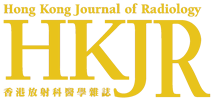The Role of Adjuvant Chemotherapy and Radiation in Women with Stage III Endometrial Cancer
CY Shum, KY Wong
Hong Kong J Radiol 2012;15:204-12
Objective: To retrospectively analyse prognostic variables, failure patterns, and overall survival in patients with stage III endometrial cancer treated with postoperative radiotherapy with or without chemotherapy and to determine the benefits of combined treatment modalities.
Methods:Between January 2006 and June 2011, 30 patients with stage III endometrial cancer were evaluated. All patients had comprehensive surgical staging procedures, consisting of total abdominal hysterectomy and bilateral salpingo-oophorectomy, with or without lymphadenectomy, and optimal debulking without any gross residual disease. Other treatment modalities included adjuvant radiotherapy and / or chemotherapy.
Results:With a median follow-up of 40 (range, 11-61) months, the three-year progression-free survival was 75% and the three-year overall survival was 76%. Disease recurred in nine (30%) patients after a median period of 14 months. Postoperative therapies included sequential chemotherapy and radiotherapy (n = 15) and radiotherapy alone (n = 15). Of the patients treated with radiation alone, seven (47%) had disease recurrence, whilst two (13%) of those treated with combined modality treatment had disease recurrence. Multivariate analysis revealed that a positive margin and adjuvant radiotherapy alone impart a greater risk of recurrence and decreased overall survival.
Conclusions: In this retrospective study, adjuvant sequential chemotherapy and radiation was associated with longer progression-free survival and overall survival in patients with pathological stage III endometrial carcinoma compared to those treated with adjuvant radiotherapy alone. Further randomised studies to define the exact role of chemotherapy and appropriate sequencing of chemotherapy and radiation are warranted.
中文摘要
化療和電療聯合治療第三期子宮內膜癌患者研究
岑翠瑜、黃家仁
目的:回顧分析接受術後電療以及化療和電療聯合治療第三期子宮內膜癌患者的預後變數、復發模 式及治療結果,以分析聯合治療的療效。
方法:本研究評估2006年1月至2011年6月期間,30位第三期子宮內膜癌患者。病人接受手術切除包 括子宮切除加雙側輸卵管及卵巢切除,或加淋巴結切除手術。病人術後無殘餘腫瘤。術後治療包括 放射治療及/或化療。
結果:跟進期中位數為40個月(介乎11至61個月)。三年病情無惡化存活率為75%,三年總生存率 為76%。9位(30%)病人有復發,復發時間的中位數為14個月。15位病人接受相繼的輔助化療及電 療,另15位病人接受單一輔助電療。7位(47%)接受單一電療及2位(13%)接受聯合治療的病人復 發。多元回歸分析證明邊緣陽性及單一輔助電療會增加復發風險及降低總生存率。
結論:本回顧性調查證實相繼的輔助化療及電療有助改善第三期子宮內膜癌患者的無惡化生存期及 總生存期。隨機對照研究將有助確定輔助化療的功用及化療和電療的適當次序。

